London breathes literature on every corner. It’s a city that feels as though it was written before it was built: you walk through its streets and sense that you could be another character in a novel. Between cafés that invite you to open a notebook, squares that hold stories, and bookshops that are true temples for readers, it’s easy to be carried away by the magic of books.
Iconic bookshops
Perhaps the most beautiful of all is Daunt Books, in Marylebone, with its glass skylight and wooden balcony that make it truly unique. There, among maps, travel editions, and endless shelves, one could lose track of time for hours.
On Piccadilly, stands Hatchards, the oldest bookshop in the city (founded in 1797) and bookseller to the Royal Family. Nearby, Maison Assouline combines a bookshop and cocktail bar, specializing in luxurious coffee table books—those you place on the living room table, almost as works of art.
Waterstones also deserves a mention—a chain that fills the city with lively, spacious bookshops, including its flagship in Piccadilly, the largest in Europe.
In Notting Hill, The Notting Hill Bookshop, made famous by the film Notting Hill, may be a little touristy, yet it remains a charming stop. Just around the corner lies Lutyens & Rubinstein, an independent bookshop that feels more like a literary salon: its exquisite selection and intimate atmosphere have made it a haven for writers and readers of the neighbourhood.
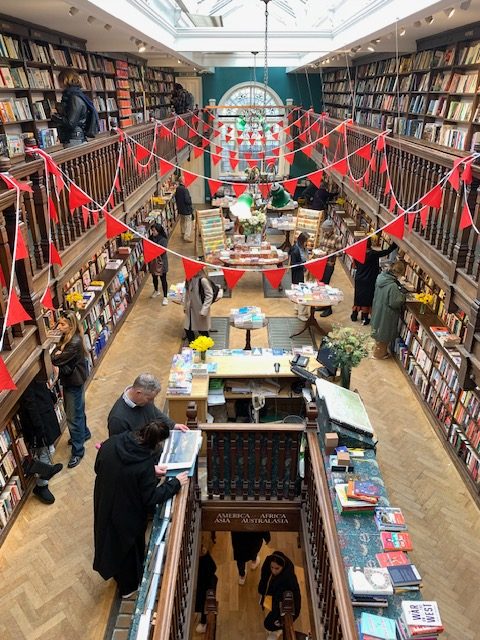
Rare and specialized
Skol Books, with its red façade, houses rare and nearly impossible-to-find editions, specializing in books printed before 1640.
Gay’s the Word, open since 1979, is London’s landmark bookshop for queer literature. The Atlantis Bookshop, near the British Museum, is devoted to magic and the esoteric. Nearby is Jarndyce, a gem of a second-hand bookshop specializing in 19th-century literature—essential for Dickens lovers.
Also in the area, The London Review Bookshop offers a beautifully curated selection and a cozy café, perfect for settling in with a book.
John Sandoe Books, in Chelsea, is a small independent haven filled with character.
Lutyens & Rubinstein, in Notting Hill, offers a refined literary selection in a boutique setting.
Stanfords, in Covent Garden, is a historic bookshop specializing in maps and travel writing since 1853.
South Kensington Books, small but elegant, is perfect for art and design enthusiasts. Just nearby, La Page, with its unmistakable red façade, is a charming independent French bookshop that brings a touch of Paris to London: intimate, bright, and carefully curated, offering literature, press, and francophone magazines.
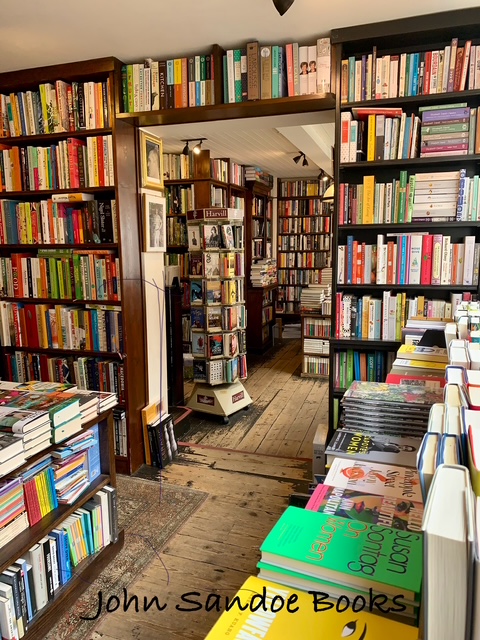
Streets of bookshops
Charing Cross Road has long been, and still is, the street of second-hand and antiquarian bookshops. There you’ll find Any Amount of Books, a magical place to get lost in, and also the memory of 84, Charing Cross Road—the famous correspondence between writer Helene Hanff in New York and the now-legendary bookshop Marks & Co., immortalized in the film starring Anthony Hopkins and Anne Bancroft.
Nearby, Cecil Court—known since 1930 as The Booksellers’ Row—may be one of London’s most literary streets. Its Victorian façades hide antiquarian and specialty bookshops, such as Marchpane, with the largest collection of Alice in Wonderland books, and Alice Through the Looking Glass, entirely devoted to Carroll’s universe.
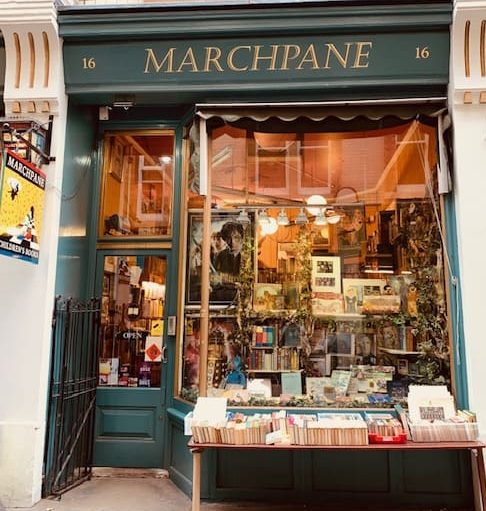
Bookshops with history and memory
Some no longer exist, yet they remain part of London’s cultural history. Silver Moon, once the largest feminist bookshop in Europe, inspired A Bookshop of One’s Own, a title that nods to Virginia Woolf’s A Room of One’s Own. It was later absorbed by Foyles, which still preserves part of its spirit.
In Bloomsbury, the neighborhood that gave its name to the literary group of Virginia Woolf and E.M. Forster, second-hand treasures like Judd Books and Skoob Books still survive—true gems hidden below ground.
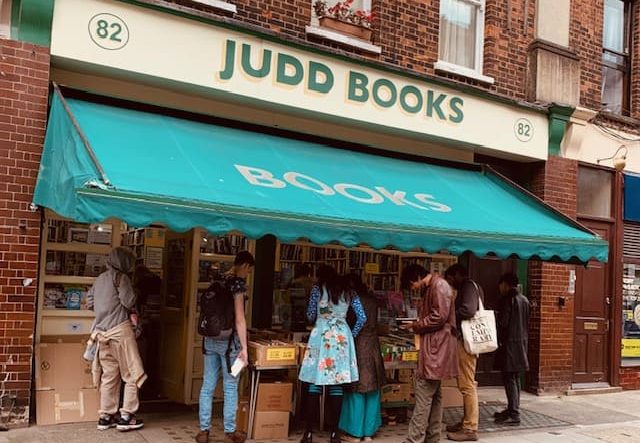
Different bookshops
Floating along the canals is Word on the Water, perhaps the most adventurous of all—a barge turned magical floating bookshop.
Brick Lane Bookshop, in the East End, is a neighborhood classic, warm and full of history. All around the city, charity-run second-hand bookshops hide unexpected treasures waiting to be found.
In Notting Hill, Books for Cooks blends literature and gastronomy: a bookshop devoted entirely to cookbooks, with a small café where the recipes from its shelves come to life. The aroma of freshly baked bread and coffee turns every visit into a delicious literary experience.
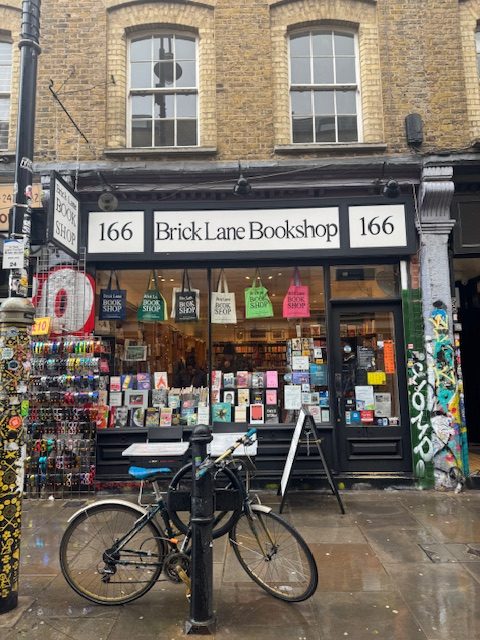
Cafés and places to read
London is not only full of bookshops—it’s also full of cozy corners to read in.
St Mary Aldemary, a Gothic church partly turned into a café, offers a calm refuge in the heart of the city.
In Fulham, Nomad Books combines bookshop and café, an ideal place to spend an afternoon.
Town House, near the pub where Jack the Ripper is said to have chosen his victims, mixes bookshop and gallery. Its 17th-century kitchen in the basement makes it even more atmospheric: the perfect spot for a hot tea and a good book on a cold day.
Clifton Nurseries, in Little Venice, has a bright café surrounded by plants and vegan options—ideal for peaceful reading.
The Actors’ Church Garden, in Covent Garden, is a green, quiet nook.
And The Chelsea Physic Garden, one of London’s oldest botanical gardens, invites you to lose yourself among plants and pages.
When the weather is kind, nothing compares to taking a book to one of London’s parks: Hyde Park, Regent’s Park, or Hampstead Heath are perfect settings to read under the sun or in the shade of a tree.
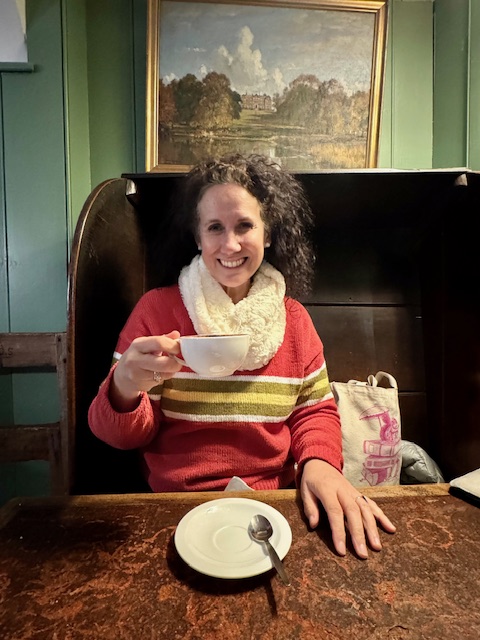
Literary note
As Jane Cholmeley recalled in A Bookshop of One’s Own—the memoir in which she relives the adventure of opening Silver Moon, the largest feminist bookshop in Europe—opening a bookshop was never just a business; it was a declaration of independence. In that act there was something profoundly literary: the desire to create a refuge, a space where words could breathe.
Virginia Woolf once wrote that every woman needs a room of her own in which to write; perhaps today she would add that she also needs a bookshop in which to lose herself. In London, that idea still lives on in every shelf, in every shop window that withstands the passing of time. Because every bookshop—no matter how small—holds a trace of resistance against the noise of the world, offering anyone who steps inside a corner where, for a moment, words truly have a home.
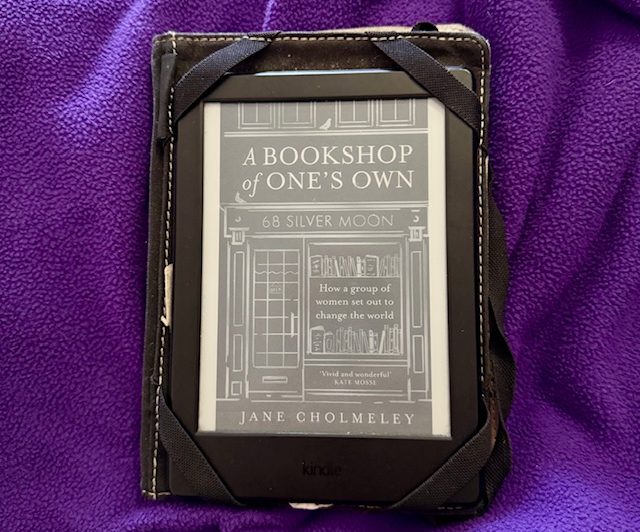



2 Responses
Lovely well researched article Alexandra. London is indeed one of the best cities for bookstores. Richmond also has some lovely little independent bookstores including The Alligator’s Mouth for children. Nearby Teddington has the best charity bookstore in Greater London “Fara Bookstore”
Well I cannot wait to find them!
yes, London oozes literature in every corner.